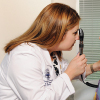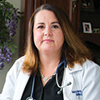Removing barriers for patients
By Martha McKenzie
 |
||||||||
 |
 |
 |
 |
 |
||||
| From national to local | Presidential appointee | Leading by example | Removing barriers for patients | Representing NPs at the table | ||||

MaryJane Lewitt has volunteered with the American College of Nurse-Midwives since she was a student and has led various efforts at national and local levels. Photography by Ann Borden
MaryJane Lewitt 13PhD CNM FACNM became hooked on volunteering with professional organizations early on. Beginning as a student representative at the American College of Nurse-Midwives (ACNM) annual meeting, she has gone on to chair several ACNM committees, including the student, membership, public relations, 50th anniversary, and, currently, the maternity system section of the National ACNM Healthy Birth Initiative. She's been just as active locally, serving as the ACNM Georgia affiliate's secretary, treasurer, vice president, and president.
|
Years in nursing: 24 Something surprising: I've run more than 20 half marathons, and this past January, I did the runDisney Dopey Challenge: a 5K on Thursday, a 10K on Friday, a half marathon on Saturday, and a full marathon on Sunday. When running, I get to implement the exercise advice that I give my patients, all the while experiencing the world through a new point of view. |
"Since I began volunteering, I don't think there has ever been a time when I haven't chaired a committee or held an office," says Lewitt, clinical assistant professor of nursing at Emory.
She is particularly proud of what she accomplished as president of the Georgia affiliate. She worked closely with the Prescriptive Authority Coalition, and at the conclusion of her term in 2006, the Georgia General Assembly passed legislation giving APRNs the authority to provide written prescriptions.
The organization has since expanded its focus, morphing into the Coalition of Advanced Practice Registered Nurses (CAPRN), which Lewitt has chaired since 2010. CAPRN unites 21 advanced practice nursing organizations across the state to advocate for patients who receive care from APRNs.
"Our work encompasses more than APRN practice," says Lewitt. "We are trying to improve health care for all Georgians by collaborating with other groups and organizations to eliminate barriers that hinder a citizen's access to timely, high-quality, safe health care."
For example, due to a wording change in legislation several years ago, APRNs are no longer allowed to order radiological tests except in life-threatening situations. The Georgia legislature interprets those tests to mean CAT scans and MRIs. Hospitals, however, often interpret "radiological tests" to mean all procedures done within the radiology department, which could include digital mammograms.
"This results in an additional barrier that prevents people from accessing appropriate, preventive health care, creates delays in obtaining that care, and increases the costs for the patient as well as the system," says Lewitt. "We are working to change that."
Related Stories
"Nursing professor Inducted as Fellow of the American College of Nurse-Midwives" (5/29/2015)


